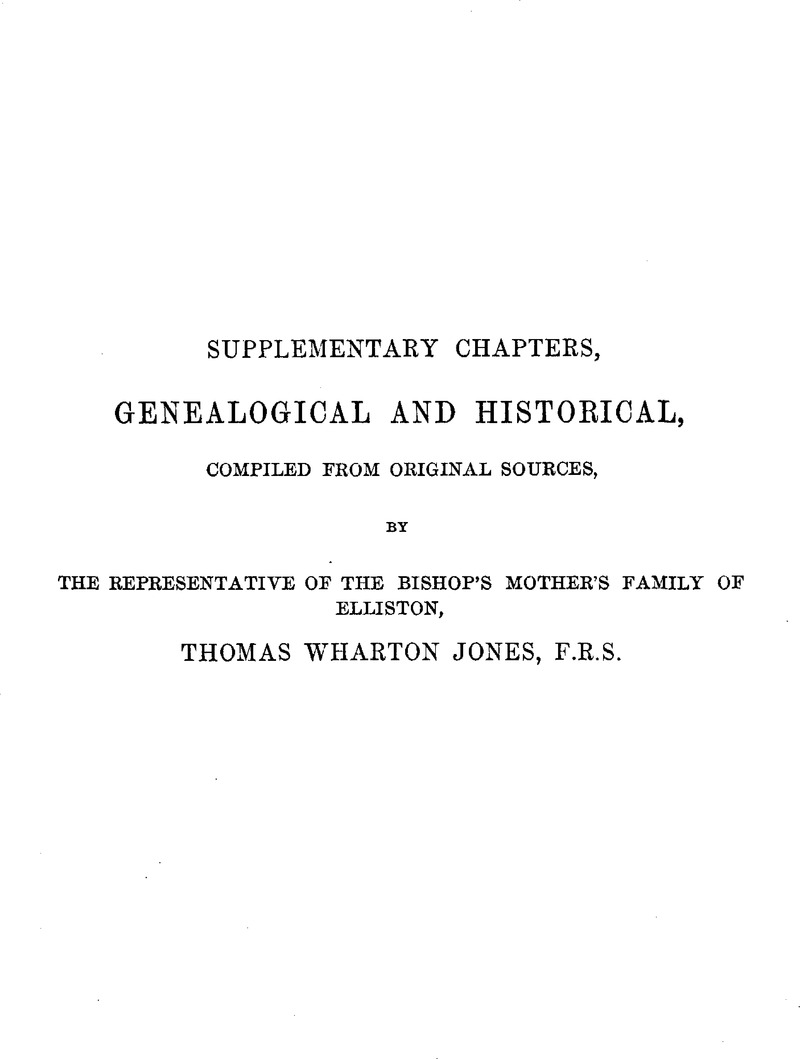No CrossRef data available.
Article contents
Chapter I. Birth and Parentage
Published online by Cambridge University Press: 24 December 2009
Abstract

- Type
- Supplementary Chapters, Genealogical and Historical, compiled from original sources
- Information
- Copyright
- Copyright © Royal Historical Society 1872
References
page 85 note * Bedell is sometimes pronounced with the accent on the last syllable, but in Essex it is pronounced with the accent on the first. That this has been the usual mode of pronunciation is shown by the frequency with which we meet the name spelt Bedle or Beadle. As to the etymology of the name, it is likely enough to have been derived from the office of a Bedell or Beadle, though it has been supposed to have had a local origin. I have seen the name variously written Bethell. This, therefore, suggests the idea that if not identical with Bethell, the name may still have had a similar ancient British derivation, and thus have been originally Ap Edell or the like, and converted into Bedell by striking off the A of the “Ap,” and converting the p into b, just as Bethell has been formed out of Ap Ithell
page 86 note * It was not uncommon in the age of the Tudors to give the same Christian name to two of the children of a family.
page 86 note dagger; See “The Pedigree of Alliston or Elliston of Essex and Kent, &c.“in the Herald and Genealogist, vol. v. 1868. According to Domesday Book certain lands in Black Notley were, in the time, of Edward the Confessor, held by a freeman named Alestan. This Alestan possessed lands in several other parishes of Essex, but was deprived of them all at the Conquest, except a portion in Notley and Stambourne. I do not know whether it was this same Alestan or another, who was a Thane, and had large possessions in Norfolk. The name Alestan is obviously the Saxon original of our Aleston, Aliston, or Alyston, with or without a double 1, and with or without a final e. As in the case of the Saxon Athelstan or Ethelstan, and the German Adelstein or Edelstein, the initial letter was written indifferently A or E, sometimes, also, Ae. Alestan, or Elestan, indeed appears to be merely a contracted form of Athelstan, Aethelstan, or Ethelstan; for example, “Elystan ” or “Ethelystan ” Glodridd, the name of the Welsh Prince who was godson of Athelstan the Saxon.
page 87 note * I have myself traced the records of the Bedell Family in the Parish Register of Black Notley, and have, in addition, been favoured with communications on the subject from the Rector, the Rev. T. Overton, B.D. to whom for his obliging courtesy my best thanks are due.
page 87 note † This is another example of repetition of the same Christian name in one family.
page 87 note ‡ In the Parish Register her burial is entered under 1623, though properly the year was as above mentioned.
page 88 note * The parchment is here so wrinkled, and the writing so defaced and indistinct, that it is not certain whether Burtel or Bulteel be the correct reading of the name.
page 90 note * For this letter see Chapter XIX.
page 90 note † In Black Notley church there is an inscription recording a benefaction to the parish, as follows :—
“Mary, daughter of Edwin Walford, of this parish, gent, married first to Humphrey Neudeck, of London, Physician, and afterwards to Capt. Thomas Kitching, dying 16th of December, 1722, left to the poor of this parish £10 a year for ever.”
page 92 note * Clogie's memoir printed from the MS. No. 6400 in the Harleian Collection, British Museum, and edited by Mr. W. Walker Wilkins: London, 1862. Bedell's words are : “Episcopo jam pene Septuagenario, Christi causa, nulla mors acerba esse potest, nulla non oppetenda.” P. 189.




